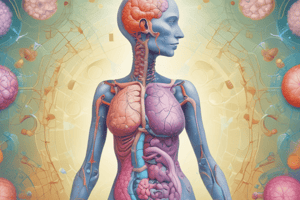Podcast
Questions and Answers
What percentage of calcium in the human body is bound in the skeleton?
What percentage of calcium in the human body is bound in the skeleton?
- 99% (correct)
- 90%
- 95%
- 80%
What is the total calcium content of the extracellular fluid (ECF)?
What is the total calcium content of the extracellular fluid (ECF)?
- 22.5 mmol (correct)
- 30 mmol
- 10 mmol
- 25 mmol
What is the primary function of calcitriol in the gut?
What is the primary function of calcitriol in the gut?
- Increasing the plasma concentration of calcium
- Reducing the plasma concentration of phosphate
- Stimulating the absorption of dietary calcium (correct)
- Inhibiting the absorption of dietary calcium
What is the effect of parathyroid hormone (PTH) on bone?
What is the effect of parathyroid hormone (PTH) on bone?
What is the primary action of calcitriol on bone?
What is the primary action of calcitriol on bone?
What is the effect of calcitriol on kidney function?
What is the effect of calcitriol on kidney function?
What is the role of the calcium-sensing receptor (CaSR)?
What is the role of the calcium-sensing receptor (CaSR)?
What is the primary effect of hypocalcaemia on PTH secretion?
What is the primary effect of hypocalcaemia on PTH secretion?
What happens to the fractional reabsorption of calcium by the kidney in response to PTH?
What happens to the fractional reabsorption of calcium by the kidney in response to PTH?
What is the primary difference between hypocalcaemia and hypophosphatemia in terms of PTH secretion?
What is the primary difference between hypocalcaemia and hypophosphatemia in terms of PTH secretion?
What is the most common cause of hypercalcemia?
What is the most common cause of hypercalcemia?
What is the significance of measuring plasma alkaline phosphatase activity in the investigation of hypercalcemia?
What is the significance of measuring plasma alkaline phosphatase activity in the investigation of hypercalcemia?
What is the primary purpose of measuring PTH in the investigation of hypercalcemia?
What is the primary purpose of measuring PTH in the investigation of hypercalcemia?
What is the effect of high phosphate intake on plasma calcium concentration?
What is the effect of high phosphate intake on plasma calcium concentration?
What is the characteristic radiographic finding in hyperparathyroidism?
What is the characteristic radiographic finding in hyperparathyroidism?
Flashcards are hidden until you start studying
Study Notes
Calcium
- Average adult body contains approximately 25,000 mmol (1 kg) of calcium, with 99% bound in the skeleton.
- Total calcium content of extracellular fluid (ECF) is 22.5 mmol, with 9 mmol in the plasma.
- Calcium in bone is stable, with the kidneys filtering 240 mmol/24h of ionized calcium.
Calcium Functions
- Structural: bone, teeth
- Neuromuscular: control of excitability, release of neurotransmitter, initiation of muscle contraction
- Enzymic: co-enzyme of coagulation factors
- Signaling: intracellular second messenger
Calcium-Regulating Hormones
- Two hormones regulate calcium: parathyroid hormone (PTH) and calcitriol (1,25-dihydroxycholecalciferol)
- Parathyroid hormone (PTH):
- Secreted by parathyroid glands in response to low plasma calcium concentration
- Inhibited by hypercalcemia
- Acts on bone and kidneys to increase plasma calcium concentration and reduce phosphate concentration
- Calcitriol:
- Derived from vitamin D
- Stimulates absorption of dietary calcium and phosphate in the gut
- Promotes mineralization in bone
- Inhibits its own synthesis in the kidneys
Calcium and Phosphate Homoeostasis
- Hypocalcaemia stimulates PTH secretion, increasing calcitriol production and calcium and phosphate uptake from the gut and release from bone
- PTH is phosphaturic, increasing phosphate excretion, but retaining some mobilized calcium
- In hypophosphatemia, calcitriol secretion increases, but PTH secretion is not stimulated
Causes of Hypercalcemia
- Two conditions account for up to 90% of cases: primary hyperparathyroidism and malignancy
Investigation and Treatment
- Plasma phosphate concentration has limited diagnostic value
- Plasma alkaline phosphatase activity can be elevated in primary hyperparathyroidism and malignancy
- Radiographic examination may reveal subperiosteal bone reabsorption and bone cysts of hyperparathyroidism
- Measurement of PTH is essential using an assay for the intact hormone
Hypocalcaemia
- Causes:
- Artefactual (collection of blood in EDTA tube)
- Associated with low PTH: hypoparathyroidism, hypomagnesaemia, hungry bone syndrome, and neonatal hypocalcaemia
- Associated with high PTH: vitamin D deficiency, disorder of vitamin D metabolism, pseudohypoparathyroidism, acute pancreatitis, high phosphate intake, massive blood transfusion with citrate blood, and acute rhabdomyolysis
Studying That Suits You
Use AI to generate personalized quizzes and flashcards to suit your learning preferences.




